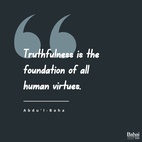The views expressed in our content reflect individual perspectives and do not represent the official views of the Baha'i Faith.
Truth is one, paths are many. – Mahatma Gandhi
Here’s a tough question: are there multiple truths, or just one truth? Isn’t truth, by definition, ultimately one thing?
These important questions have enormous relevance in modern times, because we’ve now reached a point where some people claim different groups can have “different truths”—that what’s true for you might not be true at all for me, that facts are fungible and truth is just a matter of perspective.
The most radical exponents of this theory now say that we’ve entered into a “post-truth” or “post-factual” world—a political culture where “truthiness” (to use Stephen Colbert’s comic euphemism) gets framed by appealing to the emotions rather than the intellect; and the actual, factual truth gets completely lost or hopelessly obscured.
In 2016, the Oxford Dictionaries’ chose “post-truth” as their Word of the Year, largely because of its impact on so many elections and policy debates in so many different nations and cultures.
To find out the answers to these thorny questions about the truth, let’s take a short walk through the bewildering forest of what constitutes truth in the world, and see if we can make any sense of it all.
Most philosophers will tell you we human beings recognize three different kinds of reality: 1. subjective truth; 2. deductive or logical truth; and 3. inductive or scientific truth.
Subjective truth means personal experience: for example, I hate eggplant. For me, that’s the truth, and so I avoid eating eggplant when and wherever I can. I have a good friend, though, who absolutely loves eggplant, and uses it in many of the recipes she makes. For the sake of our friendship, we have agreed to disagree on eggplant-related subjects. Subjective truth, then, is simply personal opinion, influenced by life experience and taste and cultural conditioning and as widely variable as there are people in the world. Subjective truth, then, is valid—but only in a personal way.
Deductive truth—which we arrive at through logic—can probably best be explained through the example of a syllogism: all fish swim; a trout is a fish; therefore a trout swims. That’s an ironclad, logical argument—if the premises are true, then the conclusion must also be true. Thank you Aristotle, Wittgenstein and Alfred North Whitehead. So when we want to have a productive discussion about the truth, we normally use the reasonable, rational framework of a logic path to reach it. Deductive truth, then, is universally valid.

Inductive or scientific truth, the third truth category, gets a little trickier. From scientific observations, carefully made and made repeatedly, we draw inductive conclusions about larger realities: we know it is true, for example, that the Earth is warming, because we’ve measured temperatures in so many places so many times over such a long period. We have the scientific data to prove the truth of that assertion.
But because science requires the constant revision and re-imagination of its conclusions (just ask Newton or Einstein), with scientific inquiry we can only reach a current version of what’s “true.” If I’m an astrophysicist, and I repeatedly observe that black holes have no mass, for example; some much smarter and better-informed scientist may come along at some point in the future and prove that a black hole she has managed to measure actually does have mass. There goes my theory. Science, then, by its very nature, never discovers a completely-settled truth, because inductive or scientific truth will inevitably deepen, evolve, expand and change as our ability to measure it and understand it changes. By its very nature, inductive or scientific truth always evolves. Scientific or inductive truth, then, is valid until it changes.
With those three categories of truth in mind—subjective, deductive and inductive—here’s the problem: if we ignore, confuse or conflate these three kinds of truth, we get chaos. That happens when personal, subjective truth begins to cross over into the other, deductive or inductive realms, and people begin to actually believe that there are no facts, or that their strong opinions mean they can have their own set of facts.
The writings of the Baha’i Faith actually help us clear up this chaos and confusion. That’s because actual valid truth, the Baha’i teachings say, is essentially one indivisible reality:
First, it is incumbent upon all mankind to investigate truth. If such investigation be made, all should agree and be united, for truth or reality is not multiple; it is not divisible. The different religions have one truth underlying them; therefore, their reality is one. – Abdu’l-Baha, The Promulgation of Universal Peace, pp. 105-106.
Not multiple and not divisible, Abdu’l-Baha says about the truth. If that’s true, it means that all truth and all reality combine to make a singular ultimate truth.
So truth is one, according to the Baha’i teachings, but we all experience it differently. The world has one ocean, but we call it by different names depending on our geography. We all live on one globe in one solar system in one universe, but no one has the exact same life as anyone else. Reality is one, but we each process and understand it through our distinctly individual human cultures and minds and souls. The manifestations of truth are one, but scriptures, prophets and sages vary from one era to the next. Religion is one, although it comes to us from different messengers who appear in different ages to different peoples.
Our task, then, as individual human beings, involves discovering a higher truth, and awakening to the awareness of its oneness. In the next essay in this series, we’ll examine how that can happen—if we keep an open mind about the pluralism of religion; and if we tell the truth, the whole truth and nothing but the truth.

















Comments
Sign in or create an account
Continue with Facebookor